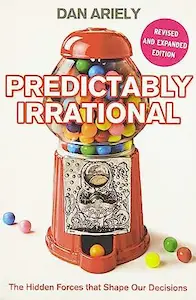Predictably Irrational - Summary
Dan Ariely

Introduction
Predictably Irrational by Dan Ariely is a fascinating book that explores the irrationality of human behavior. The book is based on Ariely’s research in behavioral economics, which shows that people often make decisions that are not in their best interests. Ariely argues that our behavior is influenced by a variety of factors, including emotions, social norms, and cognitive biases. In this essay, I will provide a summary of the book and highlight some of the key insights and examples that Ariely provides.
The Power of Expectations
One of the key themes of Predictably Irrational is the power of expectations. Ariely argues that our expectations often shape our perceptions and behavior in ways that we are not aware of. For example, in one experiment, Ariely gave participants two glasses of wine and told them that one was expensive and the other was cheap. Even though the wine was identical, participants consistently rated the “expensive” wine as better. This demonstrates how our expectations can influence our perceptions of quality.
The Cost of Social Norms
Another important theme of the book is the cost of social norms. Ariely argues that social norms can be powerful motivators, but they can also lead us to make irrational decisions. For example, in one experiment, Ariely asked participants to complete a task and offered them three levels of compensation: a small amount of money, a moderate amount of money, or a compliment from the experimenter. Surprisingly, participants who were offered a compliment performed worse on the task than those who were offered money. This suggests that social norms can sometimes be more costly than financial incentives.
The Influence of Emotions
Ariely also explores the influence of emotions on our decision-making. He argues that emotions can often override our rational thinking and lead us to make decisions that are not in our best interests. For example, in one experiment, Ariely asked participants to rate their happiness levels before and after watching a video. Participants who watched a sad video reported lower levels of happiness, but they were also willing to pay more for a product than those who watched a neutral video. This demonstrates how emotions can influence our willingness to pay for goods and services.
The Power of Defaults
Another key insight from the book is the power of defaults. Ariely argues that defaults can have a significant impact on our behavior, even when we are not aware of them. For example, in one experiment, Ariely asked participants to opt-in or opt-out of being an organ donor. When the default was to opt-in, the majority of participants chose to be donors. However, when the default was to opt-out, the majority of participants chose not to be donors. This demonstrates how defaults can shape our behavior, even when we are not actively making a decision.
The Illusion of Control
Ariely also explores the illusion of control, which is the belief that we have more control over events than we actually do. He argues that this illusion can lead us to make irrational decisions, such as gambling or investing in the stock market. For example, in one experiment, Ariely asked participants to choose between a lottery ticket and a guaranteed payout. Even though the expected value of the lottery ticket was lower, participants chose it because they believed they had more control over the outcome.
The Importance of Social Proof
Finally, Ariely discusses the importance of social proof, which is the tendency to follow the behavior of others. He argues that social proof can be a powerful motivator, but it can also lead us to make irrational decisions. For example, in one experiment, Ariely asked participants to choose between two restaurants. When one restaurant had a long line, participants were more likely to choose it, even though the other restaurant had better reviews. This demonstrates how social proof can influence our decision-making, even when we have access to objective information.
Conclusion
In conclusion, Predictably Irrational by Dan Ariely is a thought-provoking book that challenges our assumptions about human behavior. Ariely’s research shows that we often make decisions that are not in our best interests, and that our behavior is influenced by a variety of factors, including expectations, social norms, emotions, defaults, the illusion of control, and social proof. By understanding these factors, we can make better decisions and avoid some of the pitfalls of irrational behavior.